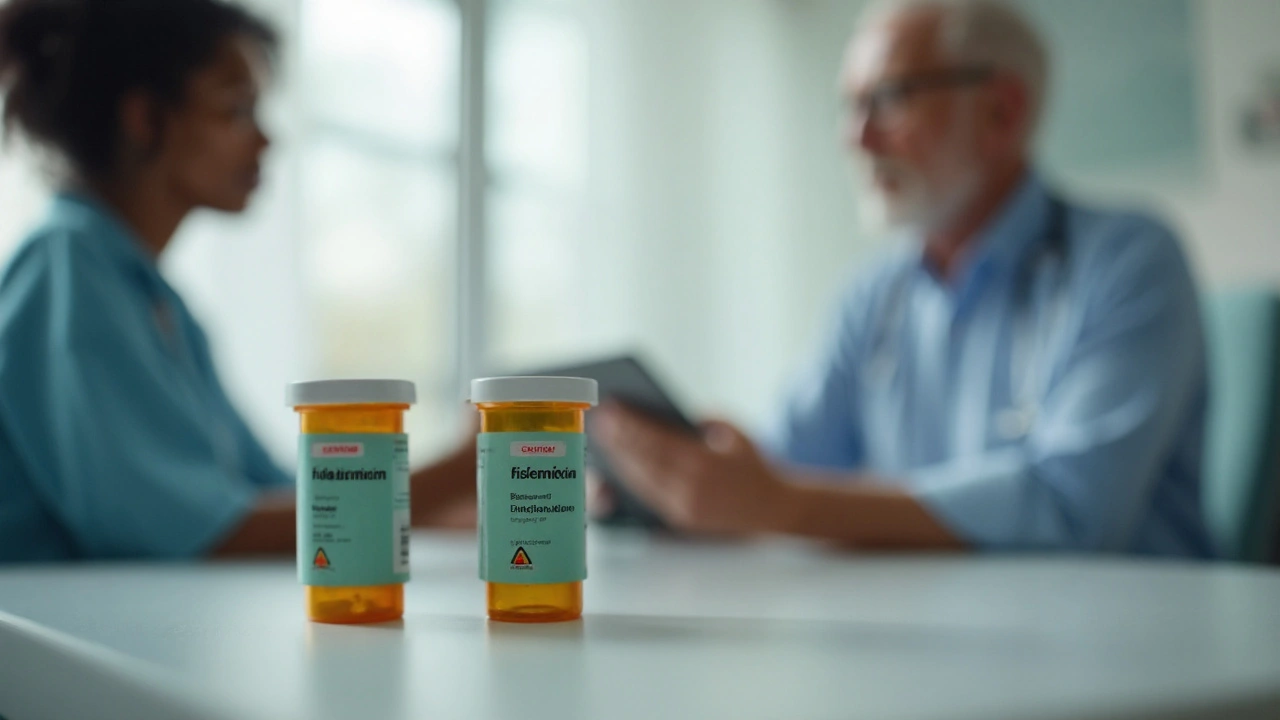C. difficile is a stubborn, gut-wrecking infection. If you clicked on this, you’re likely wondering whether tinidazole has any real role in managing it-maybe as a metronidazole alternative, maybe for recurrences, maybe when access to first-line drugs is tricky. Here’s the short answer: major guidelines don’t recommend tinidazole for CDI, and the evidence is thin. I’ll map out where it might appear at all (rarely and off-label), what actually works, and how to make better choices that lower recurrence and keep patients safer.
- Jobs you probably need done right now: understand if tinidazole works for CDI; know when (if ever) to consider it; compare it against metronidazole, vancomycin, and fidaxomicin; get a practical plan for initial cases and recurrences; avoid safety traps and drug interactions; and know what 2025 guidelines say.
TL;DR - Key takeaways
- Tinidazole is not recommended for C. difficile infection by major 2025 guidelines (IDSA/SHEA, ACG, ESCMID, Australian Therapeutic Guidelines). Evidence is limited, with no high-quality trials supporting its use.
- First-line for initial CDI: fidaxomicin (preferred) or vancomycin. Metronidazole is a back-up only if those aren’t available and disease is non-severe.
- Tinidazole’s pharmacology mirrors metronidazole-systemic absorption, variable fecal levels-which is why it underperforms compared to vancomycin/fidaxomicin for CDI.
- If you can’t access first-line agents, talk to an infectious diseases specialist. Off-label tinidazole isn’t a like-for-like swap and could lead to failures or recurrences.
- Recurrence prevention matters: fidaxomicin, bezlotoxumab, and (for multiple recurrences) FMT reduce relapse risk. Antibiotic stewardship and stopping the culprit antibiotic are essential.
Where tinidazole fits (and where it doesn’t) in C. difficile care
Tinidazole is a nitroimidazole, a cousin of metronidazole. It’s great for protozoal infections (giardiasis, amoebiasis) and bacterial vaginosis. But CDI is a different beast. To clear C. difficile, you need high, reliable drug levels in the gut lumen. Vancomycin and fidaxomicin stay in the gut-so they hit the bacteria right where it lives. Metronidazole and tinidazole get absorbed into the bloodstream, so fecal levels can be patchy and fall off as inflammation eases. That’s one reason they perform worse for CDI, especially beyond the mildest cases.
Can you use tinidazole as a metronidazole substitute for CDI? Not with confidence. There are no robust randomized trials showing it works for CDI. Guideline panels looked for those data and didn’t find enough. You’ll see scattered case anecdotes, but that’s not a basis for routine care when safer, proven options exist.
If you’re in a resource-limited setting and can’t get fidaxomicin or vancomycin, clinical teams sometimes reach for metronidazole as a last resort for non-severe disease. Even then, tinidazole isn’t a standard stand-in. It’s off-label, unproven for this use, and could delay effective treatment.
Evidence check: what studies and 2025 guidelines say
Here’s the pulse check as of 2025:
- IDSA/SHEA 2021 focused update: fidaxomicin preferred for initial CDI and recurrences; vancomycin as an alternative; metronidazole only if others aren’t available for non-severe cases. No role for tinidazole.
- American College of Gastroenterology (ACG) 2021 guideline: similar-fidaxomicin preferred, vancomycin acceptable. Doesn’t recommend tinidazole.
- ESCMID (Europe) 2021 guidance with updates since: aligns with fidaxomicin/vancomycin first, discourages metronidazole except when options are limited; tinidazole not recommended.
- Australian Therapeutic Guidelines: Antibiotic (latest update available through 2024): fidaxomicin preferred where available; oral vancomycin standard; metronidazole only if first-line agents are unavailable for non-severe; no role for tinidazole.
Why the shift away from metronidazole-like drugs? Randomized trials show fidaxomicin and vancomycin beat metronidazole for moderate-to-severe disease, and fidaxomicin cuts recurrence. The NEJM fidaxomicin vs vancomycin trials reported similar initial cure (around mid-to-high 80s%) but lower recurrence with fidaxomicin (about 15% vs 25%). Those are big gains when you’re trying to keep patients out of a relapse spiral.
For fulminant CDI (toxic megacolon, shock), oral or NG vancomycin at higher doses plus IV metronidazole remains the play because you want both luminal and systemic coverage, and you may add rectal vancomycin if ileus is present. Again, tinidazole isn’t part of that protocol.

How to manage CDI properly: first-line options and when to escalate
Here’s a clear, practical flow to anchor decisions:
- Confirm CDI and stop the culprit antibiotic if possible.
- Test only if the patient has compatible symptoms (≥3 unformed stools/day). False positives lead to overtreatment.
- If antibiotics triggered this, de-escalate or stop them; it’s one of the most effective steps to help the gut recover.
- Stratify severity and choose therapy.
- Non-severe (WBC ≤15×10^9/L and creatinine <1.5× baseline): fidaxomicin 200 mg twice daily for 10 days (preferred), or vancomycin 125 mg four times daily for 10 days.
- Severe (WBC >15×10^9/L or creatinine ≥1.5× baseline): same drugs; avoid metronidazole monotherapy.
- Fulminant (hypotension, shock, ileus, megacolon): vancomycin 500 mg QID orally/NG plus IV metronidazole 500 mg q8h; consider rectal vancomycin if ileus; urgent surgical input.
- Prevent recurrence from day one.
- Fidaxomicin harms the microbiome less, so it lowers recurrence risk. If you use vancomycin, keep the course tight and avoid unnecessary PPIs or other gut-disrupting drugs.
- Hydrate, correct electrolytes, avoid anti-motility agents like loperamide in acute CDI.
- Plan for a first recurrence if it happens.
- Options: fidaxomicin (standard 10-day course or extended-pulsed regimen), vancomycin (taper/pulse), or consider bezlotoxumab (a one-time IV antibody against toxin B) in high-risk patients.
- Second and further recurrences: consider fecal microbiota transplantation (FMT) at an accredited program, after careful donor screening.
- Reserve metronidazole only for non-severe cases when fidaxomicin/vancomycin are unavailable.
- Tinidazole is not recommended. If you’re forced into off-label territory due to access issues, escalate to an ID specialist before choosing anything nonstandard.
Why this matters: faster, guideline-concordant therapy drops complications, shortens illness, and lowers the odds of a return bout in a few weeks.
| Therapy | Absorption | Fecal levels | Guideline status (2025) | Typical adult dosing | Initial cure (approx.) | Recurrence (approx.) | Notes |
|---|---|---|---|---|---|---|---|
| Fidaxomicin | Minimal systemic | High, targeted | Preferred first-line | 200 mg BID x10 days; or extended-pulsed | ~85-90% | ~15% (lower than VAN) | Spares microbiota; costly but reduces relapse |
| Vancomycin (oral) | Not absorbed | Very high | First-line alternative | 125 mg QID x10 days | ~85-90% | ~25% | Reliable; taper/pulse for recurrence |
| Metronidazole | Systemic | Variable; declines as colitis improves | Use only if others unavailable (non-severe) | 500 mg TID x10 days | Lower in severe disease | Higher than VAN/FDX | More failures in severe CDI |
| Tinidazole | Systemic | Likely variable (similar to metronidazole) | Not recommended | Not established for CDI | Insufficient data | Insufficient data | Off-label; limited evidence |
| Bezlotoxumab | IV monoclonal antibody | N/A | Adjunct in high-risk recurrence | Single 10 mg/kg IV once | N/A | Reduces recurrence when added to standard therapy | Use with vancomycin/fidaxomicin |
Safety, interactions, and special groups (if tinidazole is considered off-label)
If a clinician is weighing tinidazole in a tough access scenario, treat it as a red-flag decision that needs specialist backup. Here’s what to weigh:
- Pregnancy and breastfeeding: Avoid tinidazole in pregnancy, especially first trimester, due to limited safety data; avoid or interrupt breastfeeding for at least 3 days after a dose. Prefer standard CDI therapies with better safety footprints and evidence.
- Alcohol: Disulfiram-like reaction risk. Avoid alcohol during therapy and for 72 hours after the last dose.
- Drug interactions: Warfarin (INR may rise), lithium (toxicity risk), disulfiram (neuropsychiatric reactions), and enzyme inhibitors/inducers that affect hepatic metabolism. Check interactions carefully.
- Neurologic toxicity: Rare peripheral neuropathy or seizures with prolonged nitroimidazole exposure. If neuropathy symptoms appear, stop and seek specialist advice.
- Hepatic impairment: Tinidazole is hepatically metabolized; use caution and consider dose adjustments only under expert guidance. Renal impairment has less impact, but consult renal dosing references if severe.
All that risk with no proven benefit in CDI is exactly why guidelines keep tinidazole off the table.
Practical decision aids: comparisons, checklists, and FAQs
Use these quick heuristics when you’re balancing options:
- Rule of thumb: If the antibiotic is well absorbed (metronidazole/tinidazole), it’s probably not your friend for CDI. If it stays in the gut (vancomycin/fidaxomicin), you’re on the right track.
- Recurrence risk trumps sticker price if the patient is high risk (age ≥65, immunocompromised, severe initial episode, on PPIs, or on concomitant systemic antibiotics). Fidaxomicin or bezlotoxumab pays off by preventing the next hospitalization.
- Do not delay effective therapy while waiting on extended stool panels or colonoscopy unless clinical judgment says otherwise. Treat the patient in front of you.
Quick checklist for clinicians
- Confirm symptomatic CDI (diarrhea plus positive test); avoid treating colonization.
- Stop unnecessary antibiotics and acid suppressants if safe to do so.
- Start fidaxomicin or vancomycin based on severity and availability.
- Avoid metronidazole unless first-line agents are truly unavailable and disease is non-severe.
- Do not use tinidazole for CDI; if you’re stuck, phone a friend (ID, gastroenterology, or antimicrobial stewardship).
- Consider bezlotoxumab for high-risk patients to reduce recurrence.
- Plan follow-up within a week to ensure symptom resolution and catch dehydration or complications early.
Mini-FAQ
- Is tinidazole ever appropriate for CDI? Only as an off-label last resort when standard drugs are inaccessible-and even then, consult a specialist. There’s no established dosing or evidence to support it.
- How does tinidazole compare to metronidazole? Similar class, similar limitations for CDI. Neither delivers consistent fecal concentrations once inflammation recedes, so both underperform compared with vancomycin/fidaxomicin.
- What about using tinidazole after metronidazole intolerance? Not a good swap. If a nitroimidazole caused side effects, tinidazole can do the same. Use vancomycin or fidaxomicin instead.
- Do probiotics help prevent CDI recurrence? Not as a routine. Evidence is mixed, and safety can be an issue in immunocompromised patients. Focus on the right antibiotic and recurrence prevention strategies.
- Should I keep PPIs going during CDI? If the patient needs a PPI for a solid indication (GI bleed risk, Barrett’s with severe reflux), fine. Otherwise, deprescribe or lower the dose-PPIs are linked to recurrent CDI.
- Can I use loperamide? Avoid anti-motility agents in acute CDI-they can worsen toxin-mediated disease. Once the patient is clearly improving, some clinicians cautiously introduce them, but that’s case-by-case.
Scenarios and trade-offs
- Community clinic with limited formulary: If fidaxomicin isn’t available and vancomycin capsules are pricey, consider compounded oral vancomycin solution (from IV powder) under pharmacy guidance. This often cuts cost while keeping the therapy guideline-concordant.
- Patient at high risk of recurrence: Choose fidaxomicin first if you can. Add bezlotoxumab during the antibiotic course if they’re older, immunocompromised, or had a recent recurrence.
- Second recurrence: A vancomycin taper/pulse or fidaxomicin extended-pulsed regimen can help. If relapses continue, refer for FMT evaluation at an accredited service.
- Fulminant CDI in hospital: High-dose oral/NG vancomycin plus IV metronidazole; urgent surgical and ICU teams on board; consider rectal vancomycin if ileus. No nitroimidazole monotherapy.
Decision tree (simple)
- Confirmed CDI? Yes → Assess severity.
- Non-severe? → Fidaxomicin preferred; vancomycin acceptable. Metronidazole only if others unavailable.
- Severe? → Fidaxomicin or vancomycin. Avoid metronidazole monotherapy.
- Fulminant? → High-dose oral/NG vancomycin + IV metronidazole ± rectal vancomycin; surgical review.
- Recurrence risk high? → Consider fidaxomicin and/or bezlotoxumab.
- No access to first-line drugs? → Call ID/antimicrobial stewardship; explore vancomycin compounding. Do not default to tinidazole.
Citations and credibility
- IDSA/SHEA 2021 focused update on CDI management.
- American College of Gastroenterology guideline on CDI (2021).
- ESCMID CDI guidance (2021 with subsequent updates).
- Therapeutic Guidelines: Antibiotic (Australia), current edition as of 2024.
- NEJM trials comparing fidaxomicin vs vancomycin (e.g., Louie et al., 2011), showing similar initial cure and lower recurrence with fidaxomicin.
Next steps and troubleshooting
- If you’re treating a first episode and the patient isn’t improving within 48-72 hours: Reassess diagnosis (could it be another cause of diarrhea?), check adherence, and confirm dosing. Escalate to vancomycin if on metronidazole. Consider complications (ileus, toxic megacolon).
- If they relapse within 2-8 weeks: Switch strategy-don’t repeat the same 10-day vancomycin course. Consider fidaxomicin, vancomycin taper/pulse, or adding bezlotoxumab. Screen for ongoing antibiotics or PPIs that you can stop.
- If access is the barrier: Talk to pharmacy about compounded oral vancomycin or patient access programs for fidaxomicin. In Australia, check current PBS status and local formulary pathways; hospital antimicrobial stewardship teams are great allies here.
- If someone suggests tinidazole: Ask “What’s the evidence? What’s the plan if it fails?” If there isn’t a clear, guideline-based reason and specialist oversight, steer back to established CDI therapies.
- If multiple recurrences despite best efforts: Refer for FMT assessment and review immune status, IBD overlap, and other risk factors. Consider bezlotoxumab if not already used.
Bottom line: tinidazole doesn’t have a defined role in CDI. You’ll get better results-with fewer bounce-backs-by sticking to fidaxomicin or vancomycin, using bezlotoxumab for the right patients, and fixing the drivers that made the gut vulnerable in the first place.




Ed Mahoney on 27 August 2025, AT 14:26 PM
Oh sure, because swapping metronidazole for tinidazole is the magic bullet we’ve all been waiting for.